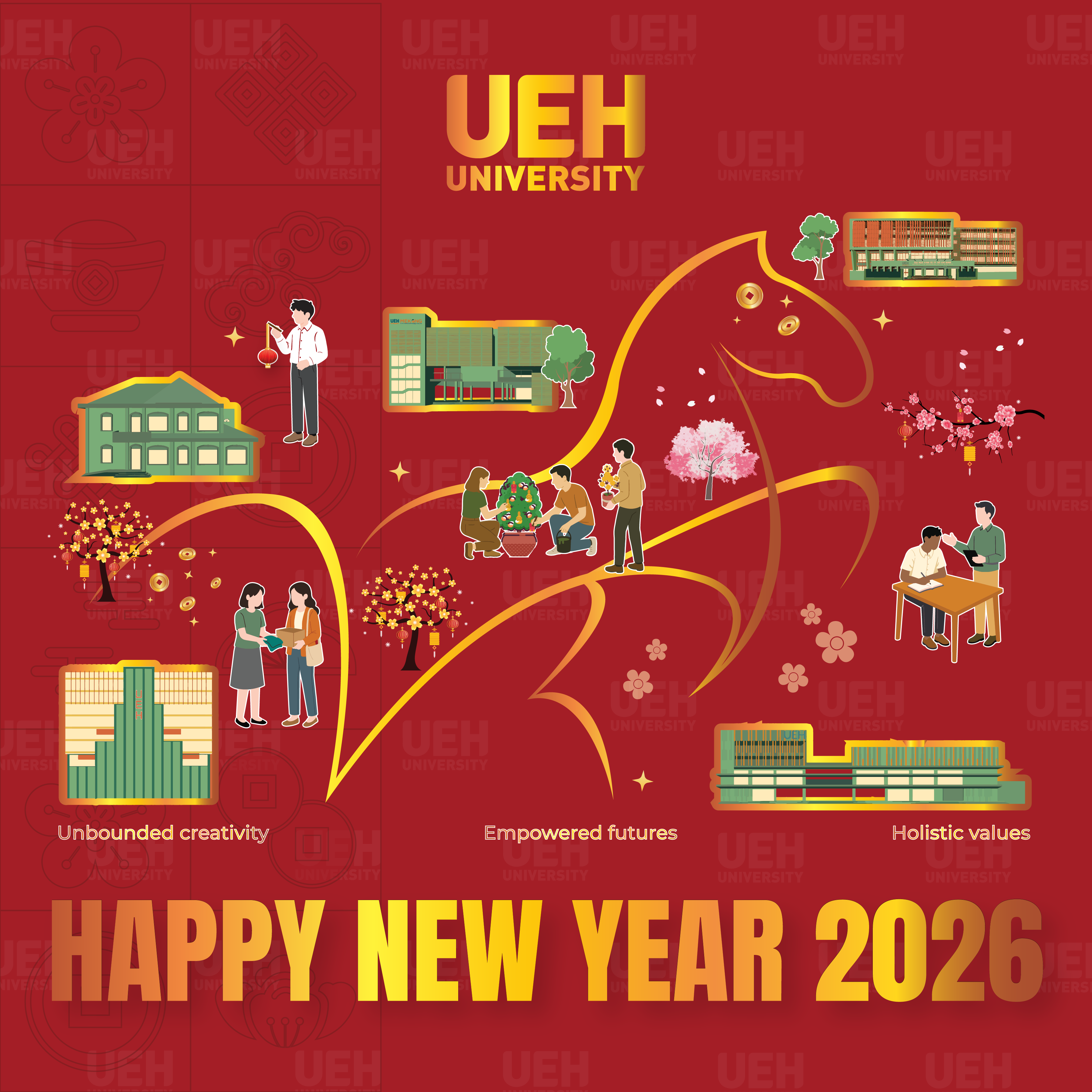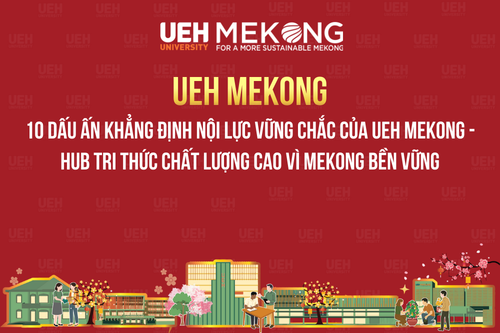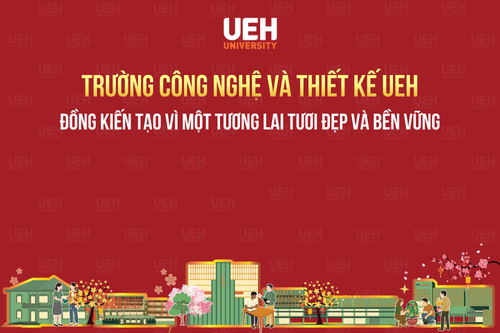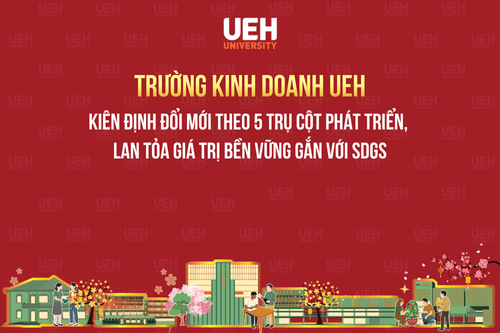
UEH - Global citizenship training, step-by-step empowering learners to act sustainably
03 Mar, 2022
During 45 years of pioneering and development with proud achievements in training, research, community connection, school operation & administration, UEH has been on the right track of sustainable University development in the world. With the restructuring strategy to become a multidisciplinary and sustainable UEH University by 2030, UEH officially positions our focus on “Training Global Citizens – Sustainable Action” with two implementation phases to achieve the target goal. The first phase, from 2022 to 2025, is focusing on “Training global citizens” and the second phase, from 2026-2030, on training in the form of ‘Empowering learners to take the initiative to act sustainably”.
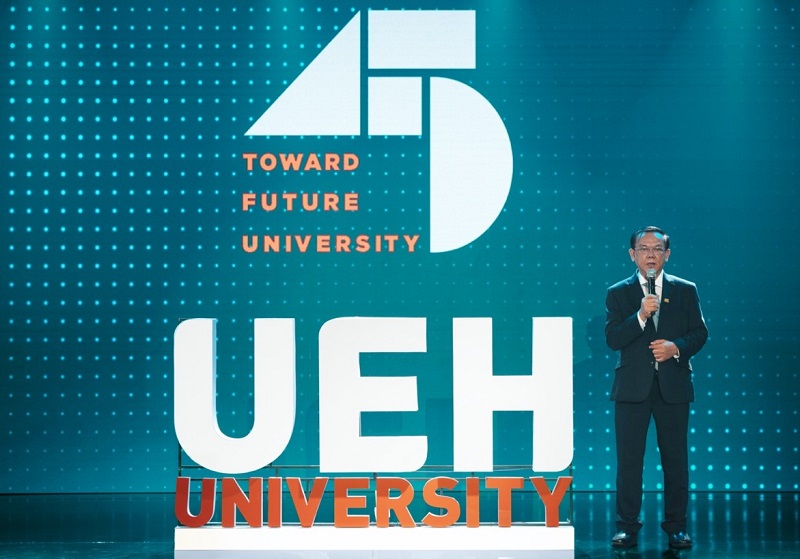
Speech of Prof. Dr. Nguyễn Đông Phong - Chairman of the Council of University of Economics Ho Chi Minh City
Global citizenship education beginning with building a global vision
The role of universities is completely important effort to realizing 17 Sustainable Development Goals (SDGs) of United Nations by 2030, in which, Global Citizen Training - Education for Sustainable Development are two urgent tasks of higher education today in all countries around the world in order to achieve the goal of Quality of Education (specifically, SDG4.7) (UNESCO. 2019). These are also two core programs to support individuals and organizations in all countries to effectively implement the remaining SDGs.
“Global citizenship training” is understood as a methodical training process, equipping learners with in-depth knowledge and global perspective, full of skills and the right and professional attitude to live – work in their field of study so that they can work effectively after graduation anywhere in the world with a global mindset – acting locally.
“Empowering learners to take initiative to act sustainably” is understood as a training process that helps learners to be ready to participate and take on active learning roles not only to solve challenges in their living locality but also contribute to solving global problems for a more peaceful, secure and sustainable society right in the process of studying at university and later (UNESCO. 2019).
“Training global citizenship and empowering learners to take the initiative to act sustainably” is concretized in three areas and is very closely linked with each other, namely awareness, social consciousness and behavior (UNESCO. 2015a). Awareness is understood as being equipped with knowledge, skills and thinking to understand local and global issues. Besides, social consciousness is understood as the sharing of values, understanding, empathy, solidarity, respect for peace, and multiculturalism. Finally, the learner's behavior must be demonstrated in the willingness to apply knowledge and skills in practice to act effectively, responsibly and sustainably.
Diverse universities around the world (especially in European countries) are implementing training activities based on the global citizenship training framework with four main pillars listed as: (i) Improving training programs tradition to update new knowledge of the 21st century; (ii) Increasing skills, attitudes and behaviors against discrimination, injustice, understanding multicultural environment for learners; (iii) Helping learners have a vision and critical thinking on global issues; (iv) Learners must be equipped with core competencies like the ability to act autonomously, to mobilize knowledge and to inspire the community (OECD 2016).
At UEH, not being different from the common development of the world, training is being the most crucial pillar. “Training Global Citizens – Sustainable Action” is both a goal and a means to realize the remaining 4 pillars of the multidisciplinary and sustainable UEH University development strategy to 2030.
UEH is ready to launch the next generation of global citizens - Empowering learners to act sustainably
On the roadmap towards implementing the new positioning value for learners at UEH as well as effectively transforming the goals of the Party Committee, UEH leadership into the entire training process at UEH. UEH also establishes clear implementation roadmaps through the consensus of lecturers, staff, learners, UEH partners and the UEHer community. UEH's training is to meet the requirements of society or to train in fields that are the strength of the school as well as to be step-by-step towards actively empowering learners listed as actively requesting study, research, practice on sustainability through an interdisciplinary – multidisciplinary training program that is personalized to learners' needs, linked to practice, and lifelong and continuous learning to contribute to the 17 SDGs.
Phase 1 (2022-2025): Training global citizens, step-by-step empowering learners to act for sustainable development. In this phase, UEH will focus on doing this in three main groups: training programs, training methods and learning methods, specific as follows:
(1) Training programs
- Training programs and products need to be adjusted comprehensively with the criteria of ‘signals, needs of society and community’, ‘global quality, international standards’ as the foundation;
- Strengthening and approaching towards 100% of programs and subjects taught in English in accordance with learners' needs, increasing foreign learners (in both developing and developed countries) to participate in learning and integrating new subjects in accordance with the development trend of the world by 2025;
- Integrating principles of sustainable development to meet the 17 SDGs into existing training programs and subjects, especially needing to be linked with the output standards of the program and of the subject for both long-term programs term and short-term programs at all levels;
- Proposing new subjects on sustainable development into existing curricula of all levels and systems in order to promote new initiatives to address local and global issues from a sustainability perspective;
- Strengthening short-term and long-term international joint programs to help learners become global citizens through cultural and academic exchanges;
- Enhancing programs that are internationally accredited and certified by world-renowned professional associations, especially those with sustainable development orientations;
- Developing multidisciplinary, interdisciplinary, bilateral-disciplinary programs in UEH and outside UEH, especially with international programs, creating favorable conditions for forming teaching capacity and general knowledge for students. form a global, diverse and inclusive perspective;
- Initially encouraging the development and implementation of extracurricular programs from awareness, attitude, behavior and so on regarding sustainable development of lecturers and students to the community;
- Enhancing seminars on interdisciplinary, multidisciplinary, cross-cultural issues, local challenges affecting cities, regions and countries, impacting the whole world or vice versa so as to foster understanding and engage learners into action for change.
(2) Training methods
- Flexible learning environment: anytime, anywhere, open learning resources, diverse learning tools;
- Diversifying training methods to focus on learners, gradually empower learners to practice/apply practice, research and supplement interdisciplinary and multidisciplinary in lecture content, required essays. project, project or examinations and more;
- Focusing on practical experiences through teamwork, field trips, projects, implementing real projects (Live-Case), problem solving projects/plans, scientific research or business orders, local and global, student activities and community projects;
- Increasing the application of technology in teaching, research, projects, projects, seminars and academic exchanges listed as e-learning, blended learning, hybrid learning and so on.
- Lecturers constantly self-study to improve their qualifications and expertise associated with sustainable development; having the opportunity to participate in extracurricular teaching, seminars, projects, research to meet the 17 SDGs;
- Increasingly inviting domestic and foreign lecturers and experts to participate in teaching theoretical, practical, projects, seminars and more on a global and sustainable perspective;
- It is a must to have the cooperation from all lecturers, to ensure multi-faceted topics, diversifying methods and resources;
- Training lecturers to develop programs, subjects, outlines and output standards in line with the sustainability goals that UEH is aiming for.
(3) Studying methods
- Actively learning about the school's global citizenship training orientation, proactively setting goals and drawing up an appropriate study plan;
- Practicing critical thinking, debating with creative and effective presentation forms in classes and extra-curricular activities;
- Actively learning, consulting with teachers, self-studying and increasing the application of technology in learning and research;
- Participating in scientific research, practical projects/projects, practical competitions increasing the opportunity to apply knowledge in practice with practical experience and forming in-depth research capacity from being UEH students;
- Actively participating in Union/Association activities to expand connections and to form systematic thinking, critical thinking, strategic action capacity, interpersonal capacity, mobilizing community resources, working together for a common goal towards a more sustainable world, to be ready to be the leader of changes;
Beneficiaries and impacts on sustainable University include not only UEH learners, faculty and employees but also alumni, businesses and local communities. UEH needs to continue to encourage alumni to participate in online courses and seminars to improve their professional qualifications and skills for work or to develop strategies to attract joint partners in training - research so as to create a sustainable UEHer community along with diverse opportunities to improve position and reputation in the industry towards the implementation of 17SDGs and so on. In addition to training programs creating the main course, UEH continues to carry out its social responsibility listed as providing free and widely available online/in-person courses to all audiences in the community to play a part in encouraging continuous learning and lifetime for all subjects.
Phase 2 (2026-2030): Empowering learners to take the initiative to act sustainably
UEH does understand that Education is to “Empower learners to take the initiative to act sustainably” does not stop at formal training; rather, this needs to be combined with continuous, lifelong training and training for all generations in the community, providing learners with important opportunities to engage them with everyday reality, motivating them to take the necessary sustainability actions. It is important for teachers and learners to have space to experiment with new “breakthrough” ideas, which can facilitate critical perspectives to come into play because the fundamental changes needed for a sustainable future start with individuals through changing their behaviors, attitudes and lifestyle choices under the influence of environmental factors and surrounding community (UNESCO. 2019).
To sum up, “Empowering learners to take the initiative to act sustainably” not only provides learners with the necessary professional knowledge and skills as well as confidence to develop in any environment, every country in the world but also proactively empowers them to come up with creative ideas and act responsibly in study, work and life, proactively facing future challenges with the ability to inspire and to lead the community around joining hands to practice sustainable lifestyle.
Therefore, in this phase, in addition to continuing to develop all the training and learning programs and methods mentioned in the previous stage, all training programs and methods in this period need to be flexibly designed and adjusted to meet the requirements of learning, understanding and solving problems and challenges in society in a creative and efficient way towards meeting the 17SDGs of each group or individual student.
What is more, UEH will actively empower students to support the local community to meet the 17SDGs through discovery, transmission, research and assessment of all local and global issues in all angles. UEH organizes a “Sustainability Day” or empowers students to organize and coordinate meetings with local people with the participation of innovative organizations in the city to address sustainability challenges of the city businesses, state management agencies or the community.
We have always understood that Training, scientific research, development consulting will decide the future of UEH. With the right commitment and goals established, UEHers and learners are united in our determination to implement the goal of ‘Training global citizens - Sustainable action’ in order to build a solid foundation, completing the Restructuring Strategy of UEH Multidisciplinary-Sustainable University with an academic reputation in the Asia region and the world./.
News, photos: Department of Sustainable Project
REFERENCES
Movement, T. G. O. (2019). What is a sustainable university? Retrieved from https://www.greenofficemovement.org/sustainable-university/
OECD. 2016. Global Competency for an Inclusive World.
UN (2015). Goal 4: Ensure inclusive and quality education for all and promote lifelong learning.
UN (2017). Higher Education Institutions - key drivers of the Sustainable Development Goals.
UNESCO (2015a). Global Citizenship Education: Topics and Learning Objectives.
UNESCO (2019). Framework for the implementation of Education for Sustainable Development (ESD) beyond 2019.
UNESCO (2015b). Education for Peace: Planning for Curriculum Reform. Guidelines for Integrating and Education for Peace Curriculum into Education Sector Plans and Policie

